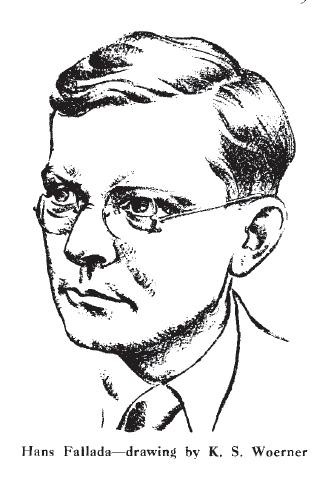12/08/2012
other "Sparrow Farm" reviews (1937-1938)
The following review has been published on March 19, 1938, in The Saturday Review of Literature.
It brings more details than the other review that we also published on this weblog, and that can be read by clicking here.

The Saturday Review of Litterature
March 19, 1938
Sparrow’s Eye View
sparrow farm. By Hans Fallada.
New York: G.P. Putnam’s Sons. 1938. $2.
Reviewed by S. A. Nock
THE little clerk turns into a sparrow, and flies off to meet his dangers and love. We are happy to fly with him, and to share his troubles with the old witch, and the bad sorcerer, and the good magician, and the foundling who becomes a magpie – happy because we delight in fairy tales. Most of us were brought up on them, and regret that we can no longer have as good a time with Grimm and Andersen and others as we used to.
Consequently, when Hans Fallada gives us a fairy tale, one in the good old German tradition, in which the characters are people, we read it with delight. Guntram and Asio and Bubo and the rest are individuals who are interesting in themselves; and what they do is perfectly satisfactory according to the requirements of a good fairy tale. Likewise, Eric Sutton’s translation of the author’s language is just right for the telling of a charming and amusing story.
The only trace of the Fallada we knew in “Little Man, What Now?” is in the criticism of humanity from the point of view of a sparrow. There is just enough of it to make us think a moment, and to chuckle over our own solemnity: then the fairy tale goes on, excitingly and beautifully. The German countryside, where all self-respecting fairy tales have their setting; the sorcerers and the witches on broomsticks and the enchanted cat, all are present. Here is that rarest of fictions, a fairy tale for grown-ups.
oOo
Catholic Herald, December 10th, 1937
Fiction Clerk In The Country
Sparrow Farm. By Hans Fallada. (Putnam, 7s. 6d.).
Reviewed by FRANCIS BURDETT
Hans Fallada tells us that Sparrow Farm, " this tale of love, and magic, and the powers of darkness," practically wrote itself. He had wished to write a short tale of the City Clerk, that same clerk no doubt " who flew into the country for a holiday," as the sub-title tells us, and visited Sparrow Farm. But the pen ran away of itself and wrote this respectably
sized book. It is charming and full of love for the countryside and for the joys of a well-stocked farm and for the rewards of toil and for animals that are almost human and sometimes a good deal more than human.
For bird-magic plays its part and owls are shown to be sinister and malevolent, as well as sometimes wise and good. And magpies steal and lie and cause trouble, and an amorous witch re-grows her lost hair by a spell but lost a year of life for every inch it grew.
Moncher and the little clerk, who changed at times into a sparrow, and the cheerful farmer, are the highlights of a delightful tale that is full of childlike wonder and thrilling perils and ultimate happiness.
18:10 Publié dans Bibliographie, Histoire, miscellanées, Textes sur Hans Fallada | Lien permanent | Commentaires (0)



